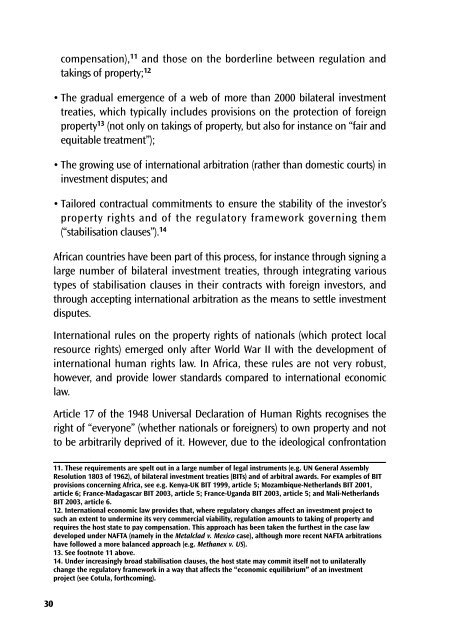Legal empowerment for local resource control
Legal empowerment for local resource control
Legal empowerment for local resource control
Create successful ePaper yourself
Turn your PDF publications into a flip-book with our unique Google optimized e-Paper software.
30<br />
compensation), 11 and those on the borderline between regulation and<br />
takings of property; 12<br />
The gradual emergence of a web of more than 2000 bilateral investment<br />
treaties, which typically includes provisions on the protection of <strong>for</strong>eign<br />
property 13 (not only on takings of property, but also <strong>for</strong> instance on “fair and<br />
equitable treatment”);<br />
The growing use of international arbitration (rather than domestic courts) in<br />
investment disputes; and<br />
Tailored contractual commitments to ensure the stability of the investor’s<br />
property rights and of the regulatory framework governing them<br />
(“stabilisation clauses”). 14<br />
African countries have been part of this process, <strong>for</strong> instance through signing a<br />
large number of bilateral investment treaties, through integrating various<br />
types of stabilisation clauses in their contracts with <strong>for</strong>eign investors, and<br />
through accepting international arbitration as the means to settle investment<br />
disputes.<br />
International rules on the property rights of nationals (which protect <strong>local</strong><br />
<strong>resource</strong> rights) emerged only after World War II with the development of<br />
international human rights law. In Africa, these rules are not very robust,<br />
however, and provide lower standards compared to international economic<br />
law.<br />
Article 17 of the 1948 Universal Declaration of Human Rights recognises the<br />
right of “everyone” (whether nationals or <strong>for</strong>eigners) to own property and not<br />
to be arbitrarily deprived of it. However, due to the ideological confrontation<br />
11. These requirements are spelt out in a large number of legal instruments (e.g. UN General Assembly<br />
Resolution 1803 of 1962), of bilateral investment treaties (BITs) and of arbitral awards. For examples of BIT<br />
provisions concerning Africa, see e.g. Kenya-UK BIT 1999, article 5; Mozambique-Netherlands BIT 2001,<br />
article 6; France-Madagascar BIT 2003, article 5; France-Uganda BIT 2003, article 5; and Mali-Netherlands<br />
BIT 2003, article 6.<br />
12. International economic law provides that, where regulatory changes affect an investment project to<br />
such an extent to undermine its very commercial viability, regulation amounts to taking of property and<br />
requires the host state to pay compensation. This approach has been taken the furthest in the case law<br />
developed under NAFTA (namely in the Metalclad v. Mexico case), although more recent NAFTA arbitrations<br />
have followed a more balanced approach (e.g. Methanex v. US).<br />
13. See footnote 11 above.<br />
14. Under increasingly broad stabilisation clauses, the host state may commit itself not to unilaterally<br />
change the regulatory framework in a way that affects the “economic equilibrium” of an investment<br />
project (see Cotula, <strong>for</strong>thcoming).

















